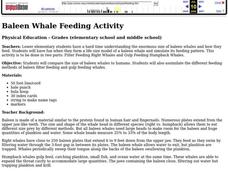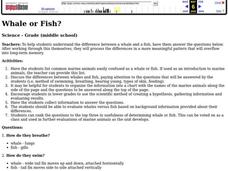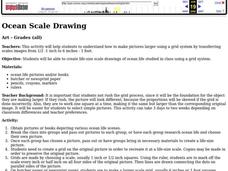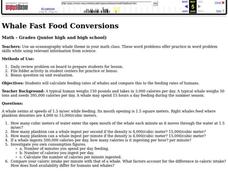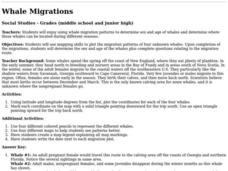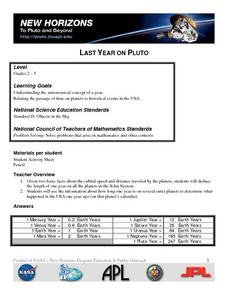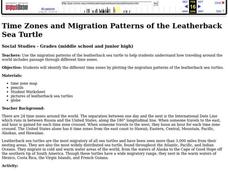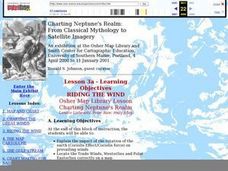Curated OER
Baleen Whale Feeding Activity
Students compare the size of baleen whales to humans. They also assimilate the different feeding methods of baleen filter feeding and gulp feeding whales.
Curated OER
Whale or Fish?
Students explain the difference between a whale and a fish. After working through this themselves, they process the differences in a more meaningful pattern that overflows into long-term memory.
Curated OER
Water Pressure - Observing Water Flow
Students discover that pressure increases the deeper the ocean becomes. They determine how water pressure differs at various depths by observing water flow.
Curated OER
Create an Underwater Scene
Students apply knowledge of underwater ocean life by creating an ocean life scene with marine animals and plants placed at appropriate ocean depths.
Curated OER
Oceanography Class Quilt
Students create and observe a collage of oceanography topics that be placed on quilt tiles in a culmination art project to represent information learned.
Curated OER
Ocean Scale Drawing
Students explain how to make pictures larger using a grid system by transferring scales images from 1/2 -1 inch to 6 inches - 1 foot. They create life-size scale drawings of ocean life studied in class using a grid system.
Curated OER
Whale Fast Food Conversions
Students calculate feeding rates of whales and compare this to the feeding rates of humans.
Curated OER
Is There Seaweed/Algae in Your Food?
Students discover that seaweed/algae is a small part of the resources the oceans provide. By investigating common household products, students discover that human senses are not enough to detect the presence of seaweed/algae in food.
Curated OER
Whale Migrations
Students use whale migration patterns to determine sex and age of whales and determine where these whales can be located during different seasons. They use mapping skills to plot the migration patterns of four unknown whales.
Curated OER
Last Year on Pluto
Students examine the astronomical concept of a year. They relate the passage of time on planets to historical events in the USA.
Curated OER
Planet/Constellation Mobile
Pupils, through small group discussion, identify and share a rationale for shapes and patterns in the construction of a mobile that represents the solar system that makes them think of the creation of our solar system.
Curated OER
Exploring Our Solar System #1
Students examine the different theories on how our solar system was formed. They discover the order of the nine planets. They also identify the surface features of each planet.
Curated OER
Time Zones and Migration Patterns of the Leatherback Sea Turtle
Learners identify the different time zones by plotting the migration patterns of the leatherback sea turtles. They discover that traveling around the worlds includes passage through different time zones.
Curated OER
Heat Flow
Students explore how a whale's countercurrent flow of blood is an example of a heat exchange system and conduction. Excellent worksheet provided.
Curated OER
The Map Cartouche
Students discuss the history and purpose of cartouches. They examine examples of cartouches and design an original example with symbols of their choosing.
Curated OER
Chart Making for Navigators
Students discuss the importance and function of nautical maps for sailors. They, in groups, take soundings of a simulated bay in a shoebox and develop a nautical chart that enable them to navigate the shoebox safely.
Curated OER
Hurricanes
Young scholars research the formation and life-span of hurricanes and, after analyzing statistics, try their hand at plotting and predicting the course a hurricane.
Curated OER
Latitude
Young scholars examine the theory of finding latitude and discuss the uses of an astrolabe, cross-staff and octant. They determine an Astronomical Table for their classroom.
Curated OER
Compass Deviation
Students identify and describe the difference between the magnetic north pole and true north. They consider why sailors could not steer a straight course to the New World from the Old.
NASA
Solar System Scale & Size
Use a variety of whole fruits to represent the different planets in the solar system to introduce scale sizes to your math or space science class. They follow suit by creating a non-scaled model of the solar system using specific-colored...
Curated OER
Baltimore as a Port of Entry
Fourth graders explore the Port of Baltimore. In this European immigration to America instructional activity, 4th graders investigate the port as port of entry between 1830 and 1850. Students examine primary documents from selected Web...
Curated OER
RIDING THE WIND
Students locate the Trade Winds, Westerlies and Polar Easterlies on a map, explain the impact of the rotation of the Earth, and plot a route for a round trip voyage from New York to London.
Curated OER
Back To The Drawing Board
Students recognize and imitate Leonardo da Vinci's unique artistic style. Through observation and practice, students capture the look of real things from many angles in actual space. They attempt their own still life drawing.
Curated OER
Cetacean or Fish?
Young scholars cut out pictures from magazines of fish and cetaceans. They make a creative bulletin board labeling their pictures and identifying different features.


